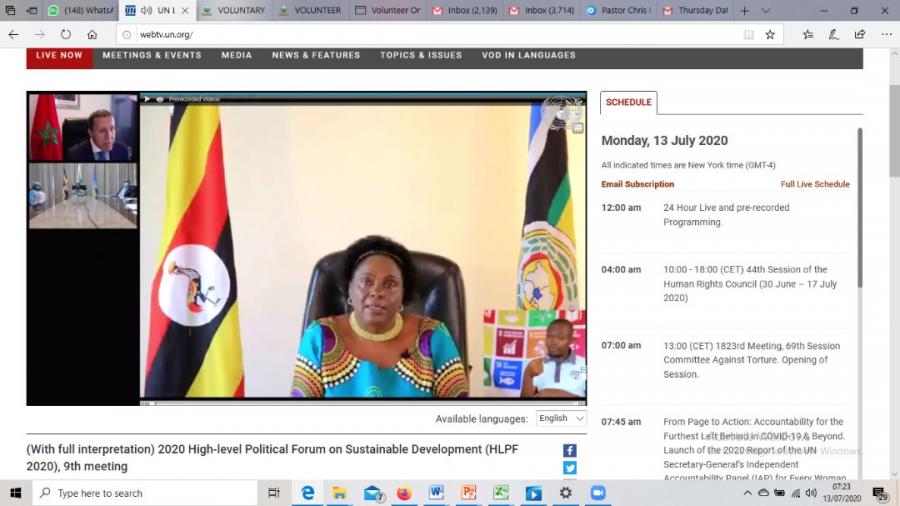
Uganda Presents its Second National Voluntary Review Report on the Sustainable Development Goals
On 13th July 2020, Ms. Mary Karoro, Cabinet Focal Point on SDGs presented Uganda’s VNR report that assessed progress on implementation of the SDGs over the past 5 years. This was part of the 2020 High Level Political Forum that is taking place in New York on 7th-18th July 2020. The Voluntary National Reviews (VNRs), are at the heart of the SDGs process which have become a critical component of the review and implementation of the 2030 Agenda and the SDGs.
Mixed Progress on SDG Implementation
The report noted that over the NDPII period (2015/16-2019/20) Uganda had registered significant progress in allocating resources and implementing the SDGs. With impressive gains in poverty reduction driven by beneficial effects of the social protection programmes in place. Access to education was also on track with achievements in basic literacy and numeracy skills. The report also commended existence of gender equality policies and laws that have increased opportunities for girls and women in Uganda. The issuance of a Gender and Equity Compliance Certificate to MDAs was highlighted as a best practice in driving gender equality in Uganda.
While Partner States applauded Uganda’s performance, they were concerned about Uganda’s escalating levels of population growth and the fact that COVID-19 would most likely undermine the progress realised over time. Similar sentiments were also raised in the CSO Rejoinder to the VNR noting that the world is in an unprecedented global emergency occasioned by the COVID-19 pandemic thus need for actions that will ensure that countries are back on track towards the SDGs path.
In their statement, CSOs highlighted the critical areas of concerns that the country needed to focus on as it e embarked on the Decade of Delivery under the most extraordinary times of COVID-19 pandemic. They noted that vulnerability to poverty remains a challenge that needed decisive action. Ending Gender based violence must be prioritized by government. More than 1 million women are exposed to sexual violence every year in Uganda. The COVID-19 pandemic has further exposed the glaring gaps in Uganda’s education system and ultimately undermining prospects for achieving SDG 4 by 2030.The current sporadic efforts to try and address issues of continuity of education are mostly flawed and further entrench the inequality in the education system[1]. Uganda’s Health system has a long way to achieve universal health coverage given the state and distribution of health facilities that undermines access and quality of health services for all.
CSO Proposals to fast-track SDG Implementation
On mitigating poverty challenges, CSOs underscored the need bailouts to business and providing essential services through government free financed services. Implementation of GBV policies and building institutional capacity to various challenges emanating from GBV was emphasized. Investing in building a resilient education system that promotes equitable education opportunities for all was proposed. Lastly, CSOs highlighted the need to build strong partnerships as the country moves into a decade for delivery of the SDG agenda. Noting that the current challenging conditions call for the enhancement and broadening of the scope of the partnership policy. An identified area for improvement was better differentiation between financer types and better integration of the civil society and private sector. As these measures will be instrumental in improving policy coherence for sustainable development which will be a critical policy strategy in the decade of action.
[1] https://glissafrica.org/storage/transitions/May2020/4QEo199HtbuCVoxfCyEI.pdf



